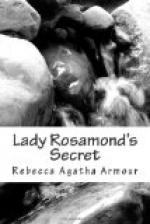While preparations are thus going on in the different apartments of Government House, a carriage arrives with its occupant, Mr. Howe, private secretary to Sir Howard. The carriage, a handsome one, is driven by a span of full-blooded Arabian horses; magnificent specimens of their species; proudly sits their owner in his costly equipage. As a man of wealth, high family, Mr. Howe occupied a prominent position in the household of the Douglas family. His coming is awaited with eagerness. Captain Douglas, his friend and companion, is at his side in a moment addressing him with hearty familiarity, “Howe, you are late. Has business been pressing? Takes some time to get reconciled to the hum drum of life in New Brunswick! Well, old fellow, send around the horses and we will yet have time for a cigar before dinner. Strange, I enjoy one better before than after. You know I am an odd bird in every sense. Was odd last evening at mess when we got the rubber.” “Douglas, one thing is confoundedly odd.” “How did the natives of New Brunswick ever impose upon the British Government to send a governor and a private secretary,” interrupted Charles Douglas. “Ha, ha, ha,” laughed the latter, with repeated and renewed attacks. “Howe, you have been baulked in some design to-day; perhaps the fair one smiled on another, or odder still, some rival is ready to exchange a few kindly shots.” “Oh, Douglas, for Heaven’s sake stop and save your breath for more interesting topics,” exclaimed the latter. The secretary lit a cigar and sat down to glance over the contents of a letter. Muttering some irreverent expressions upon the writer. “Howe, you ‘see through a glass darkly,’” yelled Captain Douglas, “to-morrow you will see face to face Major McNair and the sports of H.M. 52nd. It will be mightily odd if you do not give them a brush. Count upon me, too, as I intend to show in earnest what stuff Prince is made of.” “One thing you show,” said Mr. Howe, with a strange grin—“a desire to turn parson or priest. I might make a few suppositions without interruption. Perhaps you have been initiating yourself in the good graces of a Rev. Clergyman, by a few such quotations. Perhaps the church might take better in New Brunswick than the army. Douglas, with all your perhapses, you are a cunning diplomatist.” “You certainly do me credit, Howe,” said his friend; “I possess enough cunning to perceive that you are not in your native element this September 22nd, 1824.”
The private secretary of His Excellency, Sir Howard Douglas, was a man of no ordinary stamp. He had ability and coolness; the last named quality had gained him much favour from the veteran commander, and a desire to retain his service. Tall, slight and athletic, Mr. Howe was foremost in all feats of physical sports. Horse racing was his greatest mania. Few could manage a horse as he, and fewer still could own one faster than his favourite mare, Bess. Quickly he rose to his feet with “Jove, Douglas,




